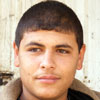B'TSELEM - The Israeli Information Center for Human Rights in the Occupied Territories
Testimony:
‘Imad a-Natur, 17, works in tunnels in the Gaza Strip to support his family, November 2009
'Imad a-Natur, 17

I am 17 and live with my parents and my seven younger siblings in a three-room apartment in the Brazil neighborhood in southeast section of Rafah.
My father has high blood pressure and diabetes, and can’t work or exert himself a lot. I started working when I was 13, because I’m the eldest and there was nobody else in my family to support us. At first, I worked as a simple laborer while still going to school. Two years ago, I saw young people my age working in the tunnels and getting paid every day, even though they were minors. I realized this was the most worthwhile place to work, so I quit school and began to work in the tunnels.

'Imad a-Natur at work. Photo: Muhammad Sabah, B'Tselem, 17.11.09.
For two years, I’ve been working in tunnels near my house, south of Rafah and along the Egyptian border. There are 400 to 500 tunnels, which are 25-30 meters underground and about a kilometer long. Each one is a bit different from the others. I work at lowering and moving the goods from the opening on the Egyptian side to the opening on the Palestinian side. Sometimes I do it by hand and sometimes I use a rail cart that runs electronically. Sometimes, I work during the day, sometimes at night. I work a 12-hour shift – from six to six. I prefer working nights because if the tunnel collapses and I have to get out on the Egyptian side, there’s less chance that the Egyptian army will detain me. When the tunnel collapses during the day, the Egyptian soldiers can catch me and degrade and beat me. About a year ago, they caught me when the tunnel collapsed and I got out on the Egyptian side. They jailed me for a few days and treated me poorly, even though I was young.
I work in the tunnels even though I’m always in danger of being killed. We often hear about a person who was killed or injured in the tunnels, and sometimes we see it happen. The Israeli planes bomb the tunnels every time a rocket is fired from the area at Israel. The bombs destroy the tunnels and kill and injure people working in them. Lots of times, the Egyptians tell the National Security forces, which belong to Hamas, that a bombing attack is expected. We get out and then go back to work after the bombing. Sometimes, they bomb the tunnel and a few hours later, after the workers have gone back to work, bomb again, and there are dead or injured. When the Egyptians find a tunnel, they arrest the workers and bomb it. Sometimes in the winter, we stop working because rain enters the tunnel, and that can cause it to collapse, killing us.
There are many dangers in working in the tunnels, and there is a constant chance of death. We are afraid, but what can we do? We won’t stop working. If we did, we’d turn into street beggars. During the war [Operation Cast Lead], we stopped working, and after that, there was work fixing up the tunnels, because that was better than doing nothing. This is the only work to be had in the Strip nowadays. The siege and the closure have halted everything in the city. Factories and businesses closed, so many of the owners of the businesses and factories, laborers, and merchants went to work in the tunnels.
Everything comes in through the tunnels: biscuits, chocolate, refrigerators, washing machines, stoves, kitchen utensils, cigarettes, sheep, cattle, milk, clothes, wood, aluminum, auto spare parts, lighting products, electronic equipment, cheese, boxes of candies, air-conditioners, pipes, plastics, and other things. Cement also comes in through the tunnels, but not in large quantities because it is heavy and hard to move. The cement is poor quality and suitable only for repairs and renovation work.
At first, I worked almost every day because there was a lot of demand for goods, and there were about 800 tunnels, much more than there are now. There was lots of work, day and night, and the pay was excellent. There weren’t bombings by the Israeli planes, and the Egyptian army did not blow up tunnels. Now, there isn’t work all the time. I sit by the tunnels and wait for a tunnel owner to hire me for a daily wage. I work three or four days a week, and I can make up to one thousand shekels a month. This is really not enough. It is impossible to live off that because goods are very expensive, despite the poor quality. We have no choice but to buy the goods because we need a coat and shoes and a woolen shirt for the winter, even if we don’t like them.
The money I earn has to pay for the food and drink, clothes, and other needs of the whole family. I need money now in particular because the ‘Eid al-Adha holiday is approaching, and I have to buy new clothes for me and my family and feel the holiday like everyone else. We don’t want to buy a sheep for the holiday for 2,000 shekels, just clothes and necessities so my small brothers and sisters will feel the holiday.
That’s our life in Gaza. It’s a hard life, full of poverty and degradation.
'Imad a-Natur, 17, lives in Rafah and works in a tunnel for smuggling goods from Egypt to the Gaza Strip. He gave his testimony to Muhammad Sabah near the tunnels in Rafah on 17 November 2009.

هیچ نظری موجود نیست:
ارسال یک نظر